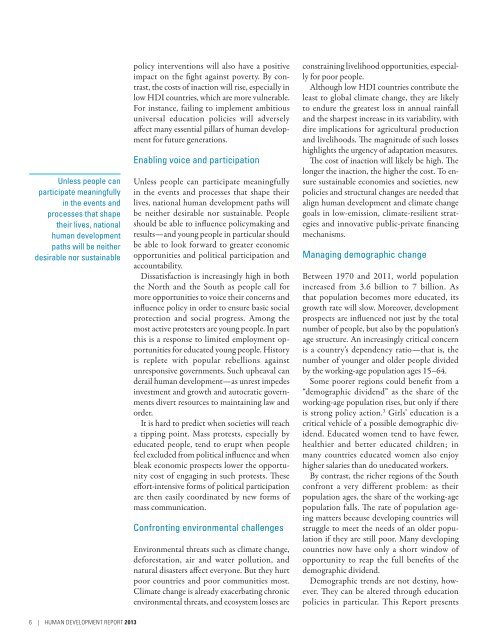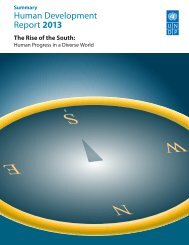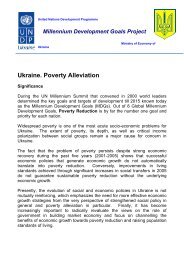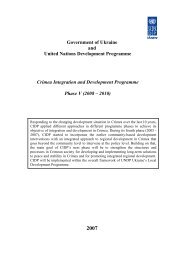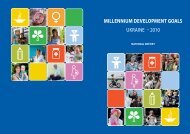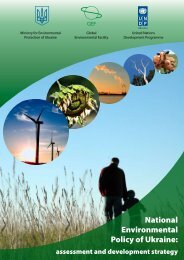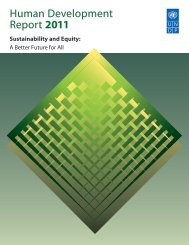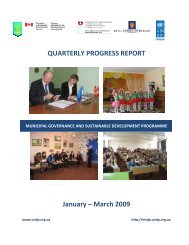E N S W - United Nations Development Programme
E N S W - United Nations Development Programme
E N S W - United Nations Development Programme
Create successful ePaper yourself
Turn your PDF publications into a flip-book with our unique Google optimized e-Paper software.
Unless people can<br />
participate meaningfully<br />
in the events and<br />
processes that shape<br />
their lives, national<br />
human development<br />
paths will be neither<br />
desirable nor sustainable<br />
policy interventions will also have a positive<br />
impact on the fight against poverty. By contrast,<br />
the costs of inaction will rise, especially in<br />
low HDI countries, which are more vulnerable.<br />
For instance, failing to implement ambitious<br />
universal education policies will adversely<br />
affect many essential pillars of human development<br />
for future generations.<br />
Enabling voice and participation<br />
Unless people can participate meaningfully<br />
in the events and processes that shape their<br />
lives, national human development paths will<br />
be neither desirable nor sustainable. People<br />
should be able to influence policymaking and<br />
results—and young people in particular should<br />
be able to look forward to greater economic<br />
opportunities and political participation and<br />
accountability.<br />
Dissatisfaction is increasingly high in both<br />
the North and the South as people call for<br />
more opportunities to voice their concerns and<br />
influence policy in order to ensure basic social<br />
protection and social progress. Among the<br />
most active protesters are young people. In part<br />
this is a response to limited employment opportunities<br />
for educated young people. History<br />
is replete with popular rebellions against<br />
unresponsive governments. Such upheaval can<br />
derail human development—as unrest impedes<br />
investment and growth and autocratic governments<br />
divert resources to maintaining law and<br />
order.<br />
It is hard to predict when societies will reach<br />
a tipping point. Mass protests, especially by<br />
educated people, tend to erupt when people<br />
feel excluded from political influence and when<br />
bleak economic prospects lower the opportunity<br />
cost of engaging in such protests. These<br />
effort-intensive forms of political participation<br />
are then easily coordinated by new forms of<br />
mass communication.<br />
Confronting environmental challenges<br />
Environmental threats such as climate change,<br />
deforestation, air and water pollution, and<br />
natural disasters affect everyone. But they hurt<br />
poor countries and poor communities most.<br />
Climate change is already exacerbating chronic<br />
environmental threats, and ecosystem losses are<br />
constraining livelihood opportunities, especially<br />
for poor people.<br />
Although low HDI countries contribute the<br />
least to global climate change, they are likely<br />
to endure the greatest loss in annual rainfall<br />
and the sharpest increase in its variability, with<br />
dire implications for agricultural production<br />
and livelihoods. The magnitude of such losses<br />
highlights the urgency of adaptation measures.<br />
The cost of inaction will likely be high. The<br />
longer the inaction, the higher the cost. To ensure<br />
sustainable economies and societies, new<br />
policies and structural changes are needed that<br />
align human development and climate change<br />
goals in low-emission, climate-resilient strategies<br />
and innovative public-private financing<br />
mechanisms.<br />
Managing demographic change<br />
Between 1970 and 2011, world population<br />
increased from 3.6 billion to 7 billion. As<br />
that population becomes more educated, its<br />
growth rate will slow. Moreover, development<br />
prospects are influenced not just by the total<br />
number of people, but also by the population’s<br />
age structure. An increasingly critical concern<br />
is a country’s dependency ratio—that is, the<br />
number of younger and older people divided<br />
by the working-age population ages 15–64.<br />
Some poorer regions could benefit from a<br />
“demographic dividend” as the share of the<br />
working-age population rises, but only if there<br />
is strong policy action. 3 Girls’ education is a<br />
critical vehicle of a possible demographic dividend.<br />
Educated women tend to have fewer,<br />
healthier and better educated children; in<br />
many countries educated women also enjoy<br />
higher salaries than do uneducated workers.<br />
By contrast, the richer regions of the South<br />
confront a very different problem: as their<br />
population ages, the share of the working-age<br />
population falls. The rate of population ageing<br />
matters because developing countries will<br />
struggle to meet the needs of an older population<br />
if they are still poor. Many developing<br />
countries now have only a short window of<br />
opportunity to reap the full benefits of the<br />
demographic dividend.<br />
Demographic trends are not destiny, however.<br />
They can be altered through education<br />
policies in particular. This Report presents<br />
6 | HUMAN DevELOPMENT REPORT 2013


